Key takeaways:
- Explaining cryptocurrency concepts to kids using relatable analogies fosters understanding of digital currency and its value.
- Early exposure to cryptocurrency promotes critical thinking and financial literacy, preparing children for future opportunities.
- Interactive platforms and games, such as CryptoKitties and Bitcoin Blast, make learning about cryptocurrency engaging and effective.
- Encouraging responsible investing habits in children involves research, budgeting, and discussing emotional intelligence in financial decisions.
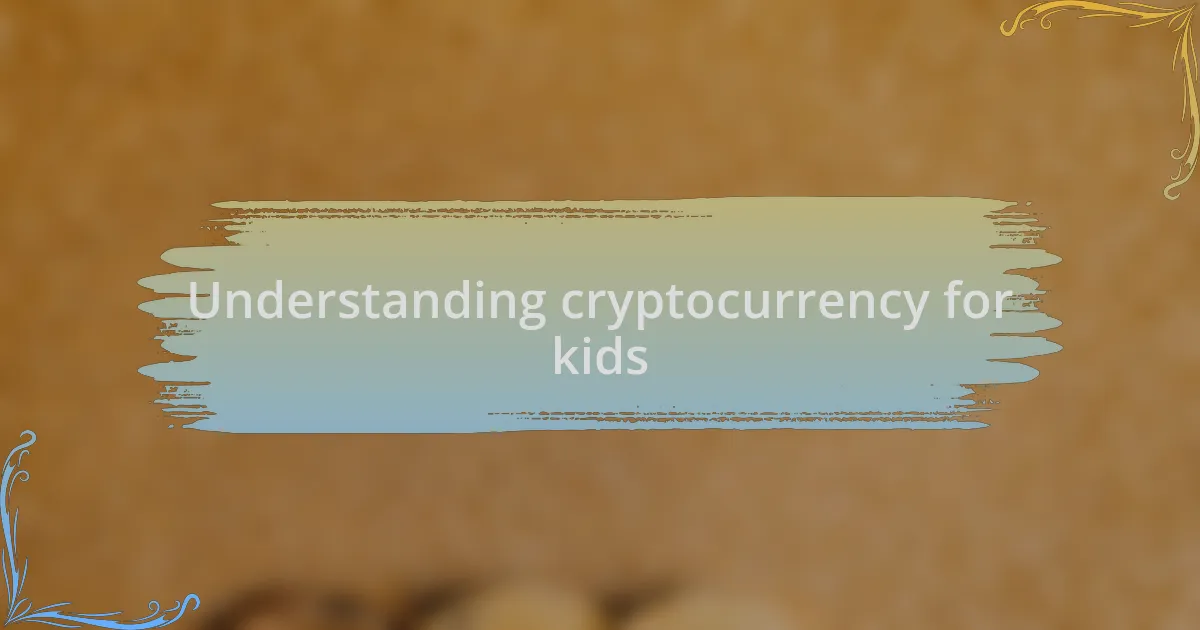
Understanding cryptocurrency for kids
When I first introduced the concept of cryptocurrency to kids, I saw their eyes light up with curiosity. It’s fascinating to realize that digital money, like Bitcoin or Ethereum, isn’t just imaginary—it’s real and operates on technology called blockchain. This decentralized system creates trust without the need for banks, which can be revolutionary for young learners.
I remember explaining to my niece how cryptocurrencies work by comparing them to the virtual coins she collects in games. That simple analogy helped her see that just like she trades her game currency with friends, people trade cryptocurrencies worldwide. Isn’t it amazing to think that kids today can grasp these ideas and potentially be part of this digital economy?
When discussing cryptocurrency with children, the focus should be on the principles of value and exchange. What does it really mean when we say something is ‘worth’ money? This question not only opens up deeper discussions about economics but also helps kids understand that money isn’t always physical—it can be bits and bytes in a digital world, too. Seeing their understanding grow is rewarding; it makes me excited about the financial literacy skills they’re developing for the future.

Importance of learning crypto early
Learning about cryptocurrency at an early age can set kids up for lifelong financial success. I recall helping a group of friends’ kids navigate a simple trading game using digital tokens. Their enthusiasm was infectious as they made decisions based on supply and demand, reinforcing the idea that understanding these concepts early can empower them as future investors.
Teaching children about cryptocurrency fosters critical thinking skills. When my own children began to grasp the idea of asset ownership, I saw them start asking questions about investments and the economy. It’s intriguing to realize how a foundational knowledge in crypto can transform their perspective on money and teach them to think strategically.
Moreover, as the digital economy continues to grow, early exposure to cryptocurrencies can provide kids with an edge in understanding emerging technologies. I often think about my own journey—had I learned these concepts as a child, how would my relationship with money be different today? This early education in crypto not only prepares them for future career opportunities but also equips them with the tools to be responsible digital citizens.
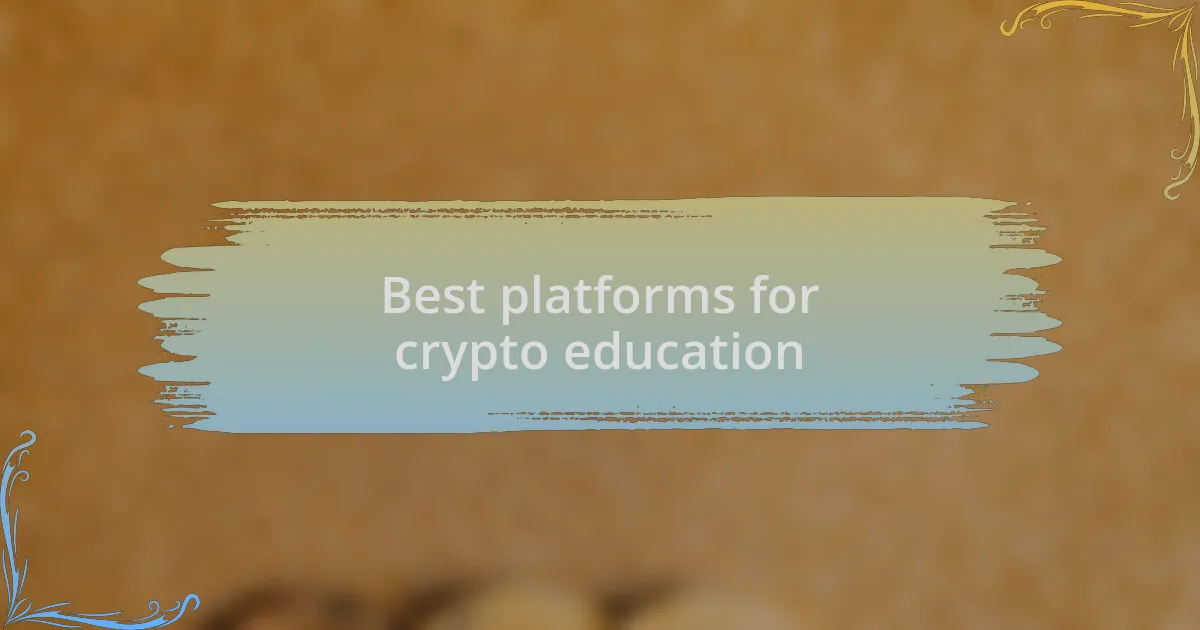
Best platforms for crypto education
When it comes to finding the best platforms for crypto education, websites like Coinbase Earn stand out to me. Not only does it offer a user-friendly interface, but kids can also earn small amounts of cryptocurrency by learning. I remember my child’s excitement as they completed simple lessons, earning tokens in the process—talk about making learning rewarding!
Another fantastic platform is CryptoKids, which combines education with fun games and quizzes. I’ve watched as my kids engaged with their interactive format, turning what might have been a dry lesson into an exciting challenge. Seeing them strategize and discuss their game approaches with friends added a social element that made the experience even more enjoyable. Have you ever noticed how much easier it is to absorb information when it’s part of a game?
Lastly, I’ve found that YouTube channels dedicated to crypto education can be incredibly effective. My kids often dive into animated explainers that make complex concepts digestible and fun. It’s fascinating how visuals can deepen understanding—just the other day, my daughter excitedly shared a video that clarified blockchain technology, and I couldn’t help but feel proud of her curiosity. How powerful is it to have access to these resources right at our fingertips?
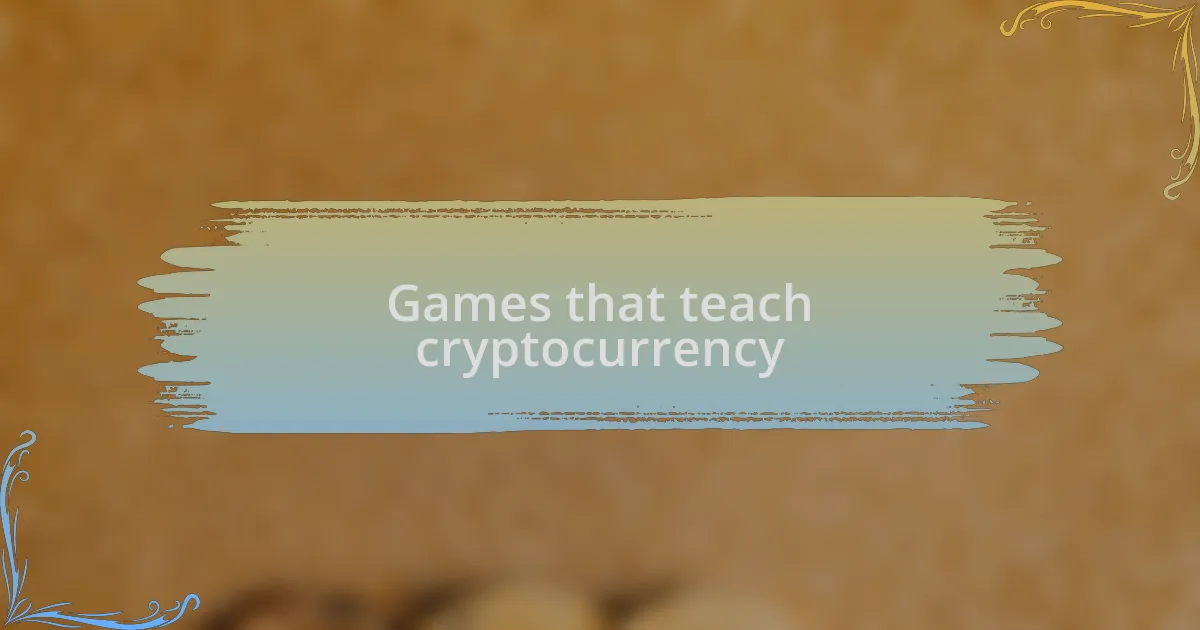
Games that teach cryptocurrency
Games that teach cryptocurrency can be incredibly engaging and informative for kids. One I highly recommend is “CryptoKitties,” where players buy, breed, and sell virtual cats using Ethereum. I remember watching my son light up as he created his first CryptoKitty, eager to learn the value of his digital asset and how the game’s economy worked. It’s amazing how hands-on experiences like this can spark interest in complex financial concepts.
Then there’s “Bitcoin Blast,” a fun puzzle game where players match tokens to earn Bitcoin. My daughter would spend hours playing, all while unknowingly absorbing the mechanics of cryptocurrency mining and trading. It occurred to me how seamlessly the game blended learning and entertainment—who knew that a simple match-three game could ignite such curiosity about economics?
Lastly, I’ve come across “Blockchain Game,” which teaches players about the technology behind cryptocurrencies through interactive gameplay. I vividly recall my kids brainstorming ways to optimize their strategies, and I realized that this type of critical thinking is invaluable. Isn’t it fascinating how a game can serve as a foundation for challenging real-world ideas? It’s these moments that truly underscore the potential of games in educating our children about cryptocurrency.
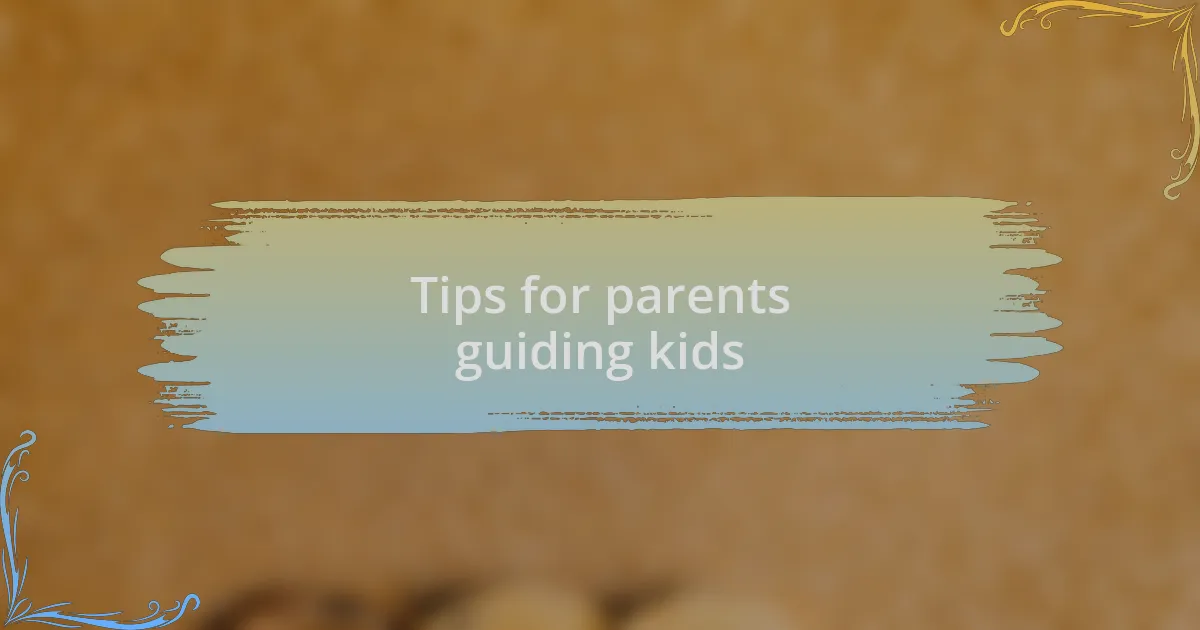
Tips for parents guiding kids
When guiding kids through the world of cryptocurrency games, it’s essential for parents to participate actively. I remember sitting beside my daughter as she navigated “Bitcoin Blast,” and our discussions about her strategies turned into lessons about supply and demand. Engaging in conversations about what she learned allowed her to internalize concepts in a relatable way—have you ever found that shared experiences lead to deeper understanding?
Another tip is to set boundaries on gameplay to ensure it remains educational rather than purely recreational. I’ve established times during the week when we delve into these games. It’s surprising how much accountability can keep the focus sharp. This not only helps manage screen time but also transforms gaming into a structured learning opportunity—have you noticed how routines can create a sense of stability for children?
Lastly, encourage your kids to share their knowledge and experiences with friends or family members. I often encourage my son to explain how “CryptoKitties” works to his cousins. Watching him confidently articulate complex ideas not only reinforces his understanding but also builds communication skills. Isn’t it rewarding to see children thrive when they take on teaching roles?
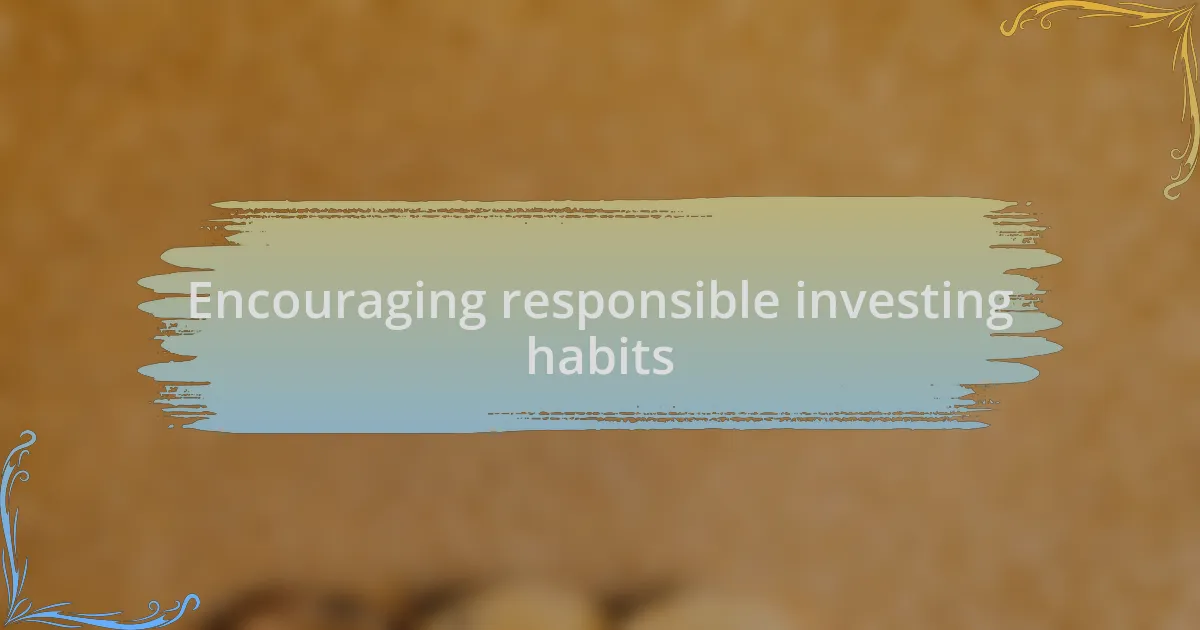
Encouraging responsible investing habits
Encouraging responsible investing habits starts with teaching kids the importance of research before making any decisions. I vividly remember when my daughter was eager to invest in a trending game token. Instead of letting her jump in, I guided her to explore the project’s background, team, and community feedback with me. This hands-on approach not only built her confidence but also highlighted how informed choices can lead to positive outcomes—don’t you find it fascinating how knowledge can empower young investors?
Setting a small budget for investments can also instill a sense of responsibility. When my son wanted to allocate his allowance to buy a rare in-game asset, I encouraged him to create a plan. We discussed potential profits and losses, which introduced real-world financial principles. I noticed that by having an actual stake in the game, he became more invested in understanding market fluctuations—have you seen how a little personal investment can spark a greater interest in learning?
Finally, it’s essential to discuss the emotional aspects of investing. I’ve had heart-to-heart conversations with my kids about the feelings that come with a losing trade. I encouraged them to view setbacks as learning opportunities. When my daughter faced a loss in a crypto game, we talked about resilience and adapting strategies, reinforcing that advocating for patience is crucial. How do your kids handle disappointment—could these discussions help them build emotional intelligence around money?